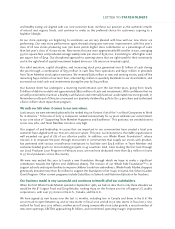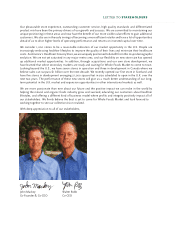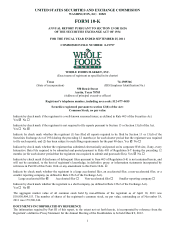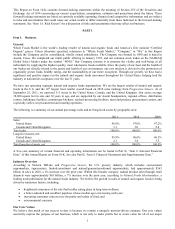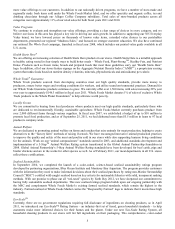Whole Foods 2011 Annual Report Download - page 15
Download and view the complete annual report
Please find page 15 of the 2011 Whole Foods annual report below. You can navigate through the pages in the report by either clicking on the pages listed below, or by using the keyword search tool below to find specific information within the annual report. 9
Co-Chief Executive Officer, John Mackey, has voluntarily set his annual salary at $1 and receives no cash bonuses or stock
option awards.
All of our full-time and part-time team members are eligible to receive stock options through annual leadership grants or
through service-hour grants once they have accumulated 6,000 service hours (approximately three years of full-time
employment). Approximately 95% of the equity awards granted under the Company’ s stock plan since its inception in 1992
have been granted to team members who are not executive officers.
Team members are encouraged to take an active role in choosing the benefits made available by the Company by
participating in a company-wide benefits vote every three years. Under the current plan voted on by team members, Whole
Foods Market provides health care at no cost to full-time team members who work 30 or more hours per week and have
worked a minimum of 10,000 service hours. In addition, the Company provides personal wellness dollars in the form of
either a health reimbursement arrangement (“HRA”) or, beginning January 1, 2012, a health savings account (“HSA"). Based
on service hours, team members receive up to $1,800 per year to help cover the cost of deductibles and other allowable out-
of-pocket health care expenses not covered by insurance.
Two initiatives developed to support our core value of Promoting the health of our stakeholders through healthy eating
education were specifically designed for our team members. They include the Total Health Immersion Program and the
Healthy Discount Incentive Program. The Total Health Immersion Program provides educational opportunities for team
members that are fully paid by the Company. Since launching this program in the fall of 2009, nearly 1,000 team members
have participated, and the program now is open to team member spouses as well, with the Company subsidizing 50% of their
cost.
The Healthy Discount Incentive Program offers additional store discounts beyond the standard 20% that all team members
receive, based on meeting designated biometric criteria (cholesterol/LDL, BMI or waist-height ratio, blood pressure) and
being nicotine-free. In fiscal year 2011, approximately 15,000 team members participated in biometric screenings, with
nearly 8,300 receiving higher-level discount cards compared to approximately 7,000 team members at the end of fiscal year
2010.
Competition
Food retailing is a large, intensely competitive industry. Our competition varies across the Company and includes but is not
limited to local, regional, national and international conventional and specialty supermarkets, natural foods stores, warehouse
membership clubs, smaller specialty stores, farmers’ markets and restaurants, each of which competes with us on the basis of
store ambiance and experience, product selection, quality, customer service, price or a combination of these factors. Our
commitment to natural and organic products, high quality standards, emphasis on perishable product sales, healthy eating
products and education, range of choices based on price, and empowered team members who focus on unparalleled customer
service differentiate us from the competition and have created a loyal core customer base. We believe our passionate support
of causes and leadership in areas important to our customers reinforce our position as the authentic retailer of natural and
organic foods, making us the preferred choice for customers aspiring to a healthier lifestyle.
Marketing
We spend much less on advertising and marketing than other supermarkets – approximately 0.4% of our total sales in fiscal
year 2011. Instead, we rely on word-of-mouth recommendations and testimonials from our shoppers, and we allocate our
marketing budgets among national and regional programs and our individual stores. We also connect and engage with our
customers through social media websites, in addition to e-newsletters, and our own website and blog at
www.wholefoodsmarket.com. Our stores spend most of their marketing budgets on in-store marketing-related activities,
including promotional signage and events such as local farmers’ markets, taste fairs, classes, tours and product samplings.
We also dedicate resources to The Whole Deal in-store value guide. Our marketing support mirrors our business model as
well as our commitment to the community and environment. Each store retains a separate budget for making contributions to
a variety of philanthropic and community activities, fostering goodwill and developing a high profile with the community.
Contributions (including in-kind contributions of food) to not-for-profit organizations amount to at least 5% of our after-tax
profits annually.
The Whole Deal
The Whole Deal value guide available in all of our U.S. stores features coupons, budget-conscious recipes and money-saving
shopping and cooking tips. Also, we feature Sure Deals which highlight everyday value pricing on high-quality products our
customers love. In fiscal year 2011, the average basket containing a coupon from The Whole Deal value guide was $68 and
19 items compared to our overall average basket in identical stores of $34 and eight items.


